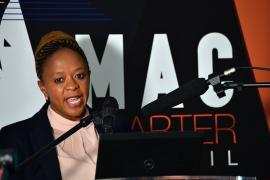
Women’s Month is not only a platform to commemorate the heroic contributions of women in South Africa’s liberation struggle but also serves as a mechanism to assess progress made to date.
“Our government focuses its attention on the rights of women and to assess how far we have come as a nation on the journey towards women empowerment and gender equality,” said Deputy Minister in the Presidency, Nomasonto Motaung.
The Deputy Minister was speaking at the Marketing, Advertising and Communications (MAC) Charter B-BBEE Council Women’s Day event held in Sandton on Friday.
She said that government continues to pursue programmes, policies and activities that seek to create a better Africa and a better world.
“Government believes that democracy has registered significant progress in restoring the dignity of women through various measures introduced by government, and this has contributed towards the empowerment of women, including availing more opportunities and access to services for women.”
Government is painfully aware that the struggle for women emancipation is far from over.
“Women still bear a disproportionate burden of the triple challenges of poverty, inequality and unemployment. Poverty and unemployment in South Africa continue to paint and portray a black female face,” she said.
“We are proud to be a country that is renowned as a multi-ethnic society. At the same time, we must all work together to end inequalities, poverty and social fragmentation.”
In 2022, working with the private sector, government appointed and launched the Marketing, Advertising and Communication Broad-Based Black Economic Empowerment Charter Council.
“We have 14 women in the council and many of whom, are chairpersons and deputies of committees.
“... there is an opportunity to learn from experienced members to impart knowledge and experiences, since the advertising sector is largely youthful.
“The assumption is that these young people, who are mainly women, derive invaluable experience from knowledge that will come from the sector.
“We are here to grow South Africa together and particularly, to grow our media, advertising and communication sector because this is a stream that shapes and is shaped by our national identity, cultures and ambitions.”
Economic growth
The Deputy Minister said South Africa through the MAC Charter Council must focus all its attention on economic growth and the key problems affecting the South African economy.
“One area of interest to us as government and to South Africans at large is that of advertising. It is an open secret that advertising is an integral part of everyday life and continues to be an important influence on people’s behaviour and attitudes, and on-demand creation in the consumer economy.”
Social cohesion
Meanwhile, Government Communication and Information System (GCIS) Acting Director-General, Nomonde Mnukwa, said social cohesion, nation building and promoting national identity are all high on the list of South Africa's priorities.
“The pillars to eradicate poverty, unemployment and inequality are based on our quest to achieve a socially cohesive nation,” she told those attending the event.
She added that job creation, reducing unemployment and inequalities are key economic and social challenges facing South Africa.
“This is clearly articulated by the National Development Plan (NDP) vision of a more unified South Africa in which the life experiences of South Africans will progressively undermine and cut across the divisions of race, gender, disability, space and class.
Madoda Dhlamini, Municipal Development Director at JCDecaux, said challenges facing society cannot be addressed in silos.
“[The] empowerment of women must be accelerated, the time is now, tomorrow is too late,” he said.
The event was attended by representatives from various advertising and communications companies, including final year Journalism students from the Tshwane University of Technology.
The MAC Charter Council, is tasked with monitoring transformation of the sector by facilitating the implementation of the B-BBEE sector code.
In addition, the Council, which has representatives from government, women, youth and organised labour, measure transformation progress made by the MAC sector. – SAnews.gov.za


